I first decided to read Lovecraft Country back in 2018 for no particular reason. I was scrolling through the titles languishing on my Kindle for something new to read and randomly stabbed the screen when I came across this particular title. I wasn’t sure what I was expecting; indeed, I cannot remember why I even purchased this book. Reading it was most definitely eye-opening, and revisiting it this year, during all of the social unrest that is currently happening made the experience even more intense. I knew that this was something that I wanted to revisit after I learned that the television adaptation was finally going to appear on HBO in August of this year, but that decision was made before everything came to a head. Reading this book, this summer, is something that was difficult for me. That’s good; sometimes the things that make us uncomfortable are the things that we need to experience in order to grow. Did revisiting this novel make me grow as a person? I hope so. I hope that those of you who have joined me found food for thought here. That said, let’s dive in.
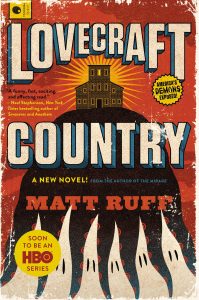 Lovecraft Country (2016)
Lovecraft Country (2016)
Written by: Matt Ruff
Genre: Dark Fantasy/Horror
Publisher: Harper
Pages: 382 (Kindle)
The Premise:
Soon to be a New HBO® Series from J.J. Abrams (Executive Producer of Westworld), Misha Green (Creator of Underground) and Jordan Peele (Director of Get Out)
The critically acclaimed cult novelist makes visceral the terrors of life in Jim Crow America and its lingering effects in this brilliant and wondrous work of the imagination that melds historical fiction, pulp noir, and Lovecraftian horror and fantasy.
Chicago, 1954. When his father Montrose goes missing, 22-year-old Army veteran Atticus Turner embarks on a road trip to New England to find him, accompanied by his Uncle George — publisher of The Safe Negro Travel Guide — and his childhood friend Letitia. On their journey to the manor of Mr. Braithwhite — heir to the estate that owned one of Atticus’s ancestors — they encounter both mundane terrors of white America and malevolent spirits that seem straight out of the weird tales George devours.
At the manor, Atticus discovers his father in chains, held prisoner by a secret cabal named the Order of the Ancient Dawn — led by Samuel Braithwhite and his son Caleb — which has gathered to orchestrate a ritual that shockingly centers on Atticus. And his one hope of salvation may be the seed of his — and the whole Turner clan’s — destruction.
A chimerical blend of magic, power, hope, and freedom that stretches across time, touching diverse members of two black families, Lovecraft Country is a devastating kaleidoscopic portrait of racism — the terrifying specter that continues to haunt us today.
As this is a book club discussion, there will be spoilers ahead.
Discussion
The titular story, “Lovecraft Country” introduces us to the man who is at the center of the conflict of the entire book, Atticus Turner. Atticus has been called home to Chicago because his father needs him. What he is needed for for unfolds into the spark that sets off the rest of the stories in the book. Turns out that Atticus never knew a great deal about his mother’s family. Surprise! He’s one of the last direct descendants of the leader of a cabal of sorcerers. His lineage means that, according to their own bylaws, this group of sorcerers has to listen to him. Yes, even though he’s black, he still holds more sway over this coven of crusty old white men. I love it.
What’s that I hear? Is it old man Lovecraft spinning in his grave again? Good.
The aforementioned cabal, and a few otherworldly things, are the only parts of the story that really dip into the trademarks of Lovecraft’s legacy. No one peers upon something so otherworldly that they lose their mind. There aren’t any Deep Ones lurking around. Lovecraft’s fiction, within this book, is simply that: fiction. There’s one brief passage in the titular story where Atticus misreads the name of the town where his father, Montrose, was supposed to be. After a brief moment of confusion, Atticus’s uncle corrects him. It’s not Arkham, but Ardham, where the elder Mr. Turner was supposedly visiting. Lovecraft’s Arkham isn’t real, of course.
Don’t get me wrong, plenty of horrific things happen in the pages of this book. Take my favorite character, Letitia. Letitia, after coming into some money, decides that she wants to own some property. What’s more, she’s not content to own property in any of the safe (read: already largely Black) neighborhoods. She wants to own a boarding house, and she’s not afraid to set up shop in a white neighborhood. Through the manipulations of Caleb Braithwhite (who is a constant, sometimes shadowy figure in every story), she comes to own a mansion that once belonged to Hiram Winthrop, a rival of Caleb Braithwhite’s family. The only real problem with the home, aside from a rather risqué statue of the goddess Hecate in the foyer, is the ghost of Mr. Winthrop and his stubborn refusal to leave. When his home is purchased by a black woman? He is pissed. He makes his displeasure very obvious, and even manages to chase Letitia’s sister Ruby (more on her later) clear out of the house. His supernatural temper tantrum is terribly frightening. I already loved Letitia, but when she faced down Winthrop’s ghost in “Dreams of the Which House,” my love grew three sizes that day.
As for her sister, Ruby…well. Let’s have a talk about that, shall we?
In “Jekyll in Hyde Park,” Ruby meets Caleb Braithwhite independently of everyone else. To her, Caleb is simply a handsome man that she meets on New Year’s Eve that she then chooses to spend the evening with, dancing, drinking, and celebrating the holiday. However, she wakes up as a white woman.
Ruby is, understandably, quite upset by this turn of events at first. Then she gets dressed and steps out in her new shape. The entire world has opened up to her. People are respectful. They listen to her. She attracts the attention of a young police officer who buys her lunch. She goes shopping with none of the usual suspicious glares that she is used to receiving. She visits a salon. This is the part that struck me the hardest. She is astounded by how quickly her treatment is complete:
The entire process — shampoo, cut, dry, and a manicure — had taken less than an hour. Ruby had known that white women had it easier but my God, this was like getting extra years on her life. (pg. 236)
These two sentences speak volumes in and of themselves. I will never know what it is to walk in a Black woman’s shoes, and reading about Ruby’s shock at how quickly her beauty treatment is complete hammers home the point of invisible privilege. Every difference Ruby experienced as a white woman made me more aware of my own life, and the advantages that I often forget that I have. It is a small thing, and not one that I have any control over, but it is still humbling to read and consider that even in something as simple as a hair cut, Black women have a very different experience.
Ruby soon discovers that her transformation is the result of a potion. Caleb has somehow tapped into the very essence of a character that briefly appeared in the first story, a white woman named Delilah, who fell into a coma due to the events of “Lovecraft Country.” She’s not dead, Caleb assures us, and this way, at least, she’s some use to someone in her vegetative state. When Ruby takes Caleb’s potion, her body sheds itself and she emerges as a picture-perfect copy of Delilah, down to the last freckle. We see her struggling with the moral quandary of the situation at the end of her tale, but the end of the book reveals that even though Caleb is long gone, Ruby has no intention of ceasing to use the potion that he brewed, as “Hillary” (the name she chooses for her new identity) is seen visiting an employment agency, wanting to speak to the owner about what opportunities might be open to her. How did you feel about Ruby’s decision? Do you blame her? Can you say what you would do if you were given the opportunity to take a potion and become an entirely new person?
By far, the most upsetting tale, for me, was “Horace and the Devil Doll.” Horace’s story is an eerie, terrible thing. Reading about a black child being harassed and eventually outright pursued by police officers was chilling. You don’t need me to tell you about the social unrest that is happening as I write this. A story centered around a child that has been singled out by law enforcement, no matter the reason, should always feel uncomfortable, but at this time, in this climate? It was downright sickening. The supernatural forces deployed against Horace were bad enough, but the parts that haunt me have nothing to do with moving objects or haunted dolls (though that particular haunted doll shoots straight up the list of creepy dolls in my book). It was a white police officer spitting in his hands and then rubbing them on a child’s head. It was the jeering manner in which his lackeys treated the boy. It was the fact that when they initially snatched Horace away from his friends, the ringleader was smoking a cigar right next to the table where the boy was under interrogation — you can’t tell me that Horace’s asthma was unknown to the these men. This petty cruelty speaks volumes. The life of one child was a price that they were willing to pay to get at Caleb Braithwhite.
Speaking of Caleb, what do you think of the twist at the end? When the extended family comes together to not only take down the Chicago cabal, but to essentially neuter Caleb Braithwhite by locking his magic away from him, it was definitely a triumphant moment. I might have pumped my fist in the air when Caleb was handed a map and told to stay away from certain cities, in an almost-callback to parts of the book that refer to cities where Black Americans weren’t welcome.
In Conclusion
I’m glad that I revisited this book, both because of the forthcoming series (which looks like it’s going to be fantastic), and because I find that I learn more from fiction than I do from straightforward nonfiction. In fiction, we are given a unique opportunity to experience a slice of life as someone else. Following this Black family through the tribulations of simply existing in America in the 1950s was an uncomfortable experience, but it’s one that I feel is necessary. The book reveals something that we all knew in the back of our minds from the beginning: the monsters aren’t really the monsters. Humans are far more terrible than anything that has ever emerged from the imagination of a creative individual.
Recommended Reading
Wintertide and Deep Roots by Ruthanna Emrys, obviously. There are few things that I love better than watching Lovecraft’s deepest prejudices being turned on their head, and Ruthanna Emrys has done a fabulous job of doing this by turning the people Lovecraft hated the most (essentially everyone who wasn’t a cis, straight, white man) into the heroes of the story.
EDIT: If you’d like to try out Emrys’s fiction to see if it might be to your liking, please read the prequel novella, “The Litany of Earth” on Tor.com.
Maplecroft and Chapelwood by Cherie Priest. More fun with People Lovecraft Hated saving the day! This duology is more traditionally horrific — Lizzie Borden versus the Deep Ones! — and it combines two subjects that one wouldn’t think would go together, but somehow do. Bonus points for kickass lady scientists, and Lizzie Borden’s scandalous (at the time) relationship with a renowned stage actress.
Participation Poll
August’s Book Club Selection: Weaveworld by Clive Barker, hosted by Michelle R. Lane on Friday, August 28th!

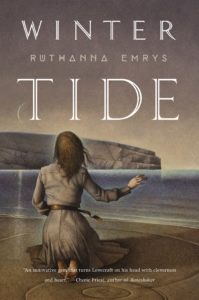
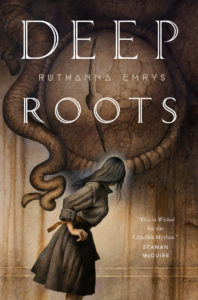
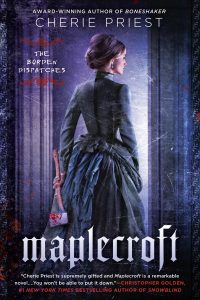
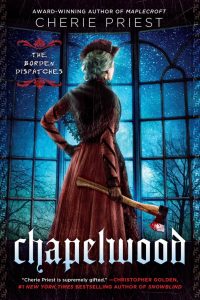
I read this book in January. That seems far longer ago than it actually is at this point. But even in January, the racial themes hit home.
I *really* enjoyed it. Atmospheric, scary, full of intrigue and underdog heroes. So many great women characters I also loved Leticia and Ruby’s story was wonderful for exploring moral gray areas. Hippolyta might actually be my favorite though, finding a way to be an explorer in a world that wants to relegate her to a much smaller geography.
I also loved Leticia and Ruby’s story was wonderful for exploring moral gray areas. Hippolyta might actually be my favorite though, finding a way to be an explorer in a world that wants to relegate her to a much smaller geography.
Thanks for the other suggestions for books to read. I LOVED Cherie Priest’s Boneshaker, but I didn’t know about either of these titles.
I’m so glad to hear your thoughts. Ruby’s story is very much one that dives deep into shades of gray and gives the reader a lot to think about. I honestly don’t know what I thought about her decision at the end.
Hippolyta’s a great character, too. I love the point that you made, about her being determined to break out of the areas that she was “allowed” to exist in and pushing boundaries. It was her story that stuck with me for two years, originally. But this time around, perhaps because of the social climate, Ruby’s and Horace’s stories are the ones stuck in my head. I keep thinking about that ending, where Hillary goes to meet up with the woman at the employment agency. In the afterward, Ruff suggested that there may be a sequel in the future, possibly, and I really hope that it comes to fruition. I’d especially like to see what happens to Ruby/Hillary.
And you’re welcome! Priest is an excellent writer. I wish that there were more Borden books, honestly. I hope that you check out Ruthanna Emrys also. She really does do a marvelous job of humanizing the so-called monsters of Lovecraft’s fiction and I am desperately holding out hope that her series will continue. You can read the prequel novella “The Litany of Earth” for free right here: https://www.tor.com/2014/05/14/the-litany-of-earth-ruthanna-emrys/ — to see if she might be to your taste. In fact, I’m going to edit the post to include the link!
I want to say I read this in 24 hours, but maybe it was less that 48. Either way, once I started, I was captivated and had a terrible time putting it down. I worried a bit about reading it because I was afraid that my lack of experience with Lovecraft’s work would put me at a disadvantage, but it doesn’t sound like I missed out on much in that regard. The real horror was how these characters were treated, and the real satisfaction came from watching them overcome. Thanks for such a great pick!
It’s not a truly Lovecraftian work, but the little sprinkles here and there were definitely well-done. And the idea that certain areas of the country were considered “Lovecraft country” made a lot of sense. Here, for certain people, one will find nothing but horror and madness if you stay too long. I was struck by the story that George (I think?) told about the man who was pulled over in the “sundown city” and the horrifying terror that I felt when that poor man was chased out of town and nearly killed, before having to take a route through CANADA to get back home. Utterly terrifying and awful, and sadly something that I am see happening. Humans really are the monsters every single time.
This was by far my favorite book club selection, to include the book that I chose. I’m so excited to see the TV show because this story in Jordan Peele’s hands is going to be amazing and it is coming on a channel that I actually have.
I’m never read any Lovecraft and have only a passing familiarity with what his work was about but I don’t feel like that impeded my ability to enjoy the story. At first, I didn’t realize that Lovecraft Country was a series of interconnected stories, so when I got to “Dreams of the Which House,” I was confused and asking, “What happened to Atticus?” I didn’t think I would like the change in perspectives, but all of the stories were so well done that I ultimately realized it was that right choice. My very favorite story was “Hippolyta Disturbs the Universe.” It was weird, creepy, and brilliant. I was entranced by the other worlds. I also found it tragic because there was no way for Hippolyta to become an astronomer at that time period. It made me think of all the brilliant people whose talents were wasted because of racism. I do love that in the end, Hippolyta plans to go back.
I really need to read Ruthanna Emrys’ books. The library doesn’t have them, which is a bummer.
Alas, my poor memory prevents me from going on in detail about what I loved about this book. I am glad I read it and like Shara, I devoured it rather quickly.
I read Lovecraft short stories when I was in my teens but don’t recall much other than they all seemed to follow the same plot. I never read his longer works so I wasn’t real sure of getting the references. How Er, I did get the theme of real life containing as much horror as the supernatural might produce.
I too am excited to watch the HBO series – starting in only six weeks!
Is it odd that it was written by a white man? I have enjoyed several of his early novels but they didn’t seem to have any great insight into minorities.